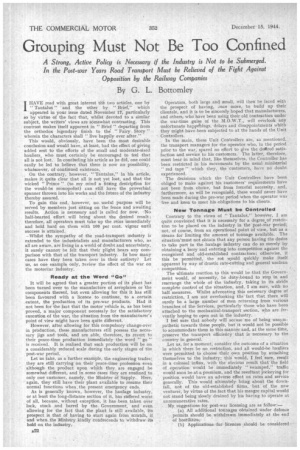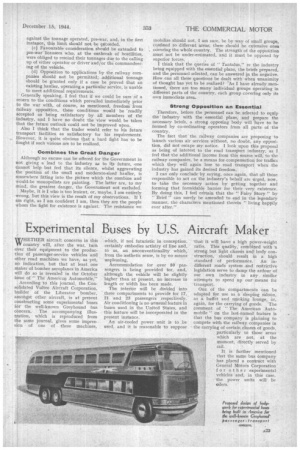Grouping Must Not Be Too Confined
Page 24

Page 25

If you've noticed an error in this article please click here to report it so we can fix it.
A Strong, Active Policy is Necessary if the Industry is Not to be Submerged. In the Post-war Years Road Transport Must be Relieved of the Fight Against Opposition by the Railway Companies
By G. L Bottomley
IHAVE read with great interest the two articles, one by " Tantalus " and the other by " Brief," which appeared in your issue dated November 17, particularly so by virtue of the fact that, whilst devoted to a similar subject, the writers' views are somewhat contrasting. This contrast makes itself apparent in " Brief " departing from the orthodox legendary finish to the' " Fairy Story" wherein the characters shall " live happily ever after."
This would, obviously, have been the most desirable conclusion and would have, at least, had the effect of giving added zest to the efforts of the small and moderate-sized hauliers, who must certainly be encouraged to feel that all is not lost. In concluding his article as he did, one could easily be led to believe that there is now no possibility, whatsoever, of continued existence.
On the contrary, however, " Tantalus," in his article, makes it quite clear that all is not yet lost, and that the wicked " Prince " (to my mind a fitting description for the would-be monopolist) can still have the proverbial spanner thrown into his works and the future of the industry thereby assured.
To gain this end, however, no useful purpose will be served by members just sitting on the fence and awaiting results. Action is necessary and is called for now. No half-hearted effort will bring about the desired result; therefore, all operators must take up the reins immediately and hold hard on them with 100 per cent. vigour until success is attained.
Whilst the sympathy of the road-transport industry is extended to the industrialists and manufacturers who, as all are aware, are living in a world of doubt and uncertainty, it surely cannot be felt that their plight bears any comparison with that of the transport industry. In how many cases have they been taken over in their entirety? Let us, as one example only, review the effect of the war on the motorcar industry.
Ready at the Word "Go" It will be agreed that a greater portion of its plant has been turned over to the manufacture of aeroplanes or the components thereof, but even allowing for this it has still been favoured with a licence to continue, to a certain extent, the production of its pre-war products. Had it not been for the fact that the motor vehicle is, as has been proved, a major component necessary for the satisfactory execution of the war, the situation from the manufacturer's point of view might have been quite different.
However, after allowing for this compulsory change-over in production, these manufacturers still possess the necessary jigs and tools, and are able, therefore, to revert to their peace-time production immediately the word " go " is received. It is realized that such production will be on a considerably reduced scale during the early stages of the post-war period. , Let us take, as a further example, the engineering trades; they are still carrying on their peace-time profession even although the product upon which they, are engaged be somewhat different, and in some cases they are confined to only one customer, namely, the Minister of Supply. Here, again, they still have their plant available to resume their normal functions when ,the present emergency ends. As is generally known, however, the haulage industry, or at least the long-distance section of it, has suffered worst of all, because, without exception, it has been taken over lock, stock and barrel by the Government, and even allowing for the fact that the plant is still available, its prospect is that of having to start again from scratch, if and when the Ministry kindly condescends to withdraw its hold on the industry, Operators, both large and small, will then be faced with the prospect of having, once more, to build up their clientele, and it is to be sincerely hoped that manufacturers, and others, who have been using their old contractors under the war-time guise of the M.O.W.T., will overlook any unfortunate happetings, delays and disappointments which they might have been subjected to at the hands of the, Unit Controllers.
In the main, these Unit Controllers are, as mentioned, the transport managers for the operator who, in the period prior to the war, spared no effort to give the delAred satisfaction and service to his customers. The latter, therefore, must bear in mind that, like themselves, the Controller has been restricted in his movements by the usual ministerial " red tape " which they, the customers, have no doubt experienced. The decisions which the Unit Controllers have been obliged to make against his customers' requirements have not been from choice, but from forceful necessity, and. furthermore, as will be recognizkl, these would never have been made during the pre-war period when the operator was free and keen to meet his obligations to his clients.
New Tonnage Must be Controlled Contrary to the views of " Tantalus," however, I am quite convinced that it is necessary for a degree,,of restriction to be placed on the industry in the post-war period: not, of course, from an operational point of view, but as a means for limiting the amount of tonnage available. The situation`must not obtain that any person having the desire to take part in the .haulage industry can do so merely by obtaining a lorry and entering into competition against the recognized and old-established contractors.; otherwise, if this be permitted, the rot would quickly make itself apparent by way of drastic rate-cutting and general unclean competition. The ultimate reaction to this would be that the Government would, of necessity, be duty-bound to step in and rearrange the whole of the industry, taking in its stride complete control of the situation, and, I am sure, with no half measures. Whilst advocating this necessary degree of restriction, I am not overlooking the fact that there will surely be a large number of men returning from various branches of the Services, particularly those who have been attached to the mechanical-transport section, who are fervently hoping to open out in the industry.
I feel sure that nobody will accuse me of being unsympathetic towards these people, but it would not be possible , to accommodate them in this manner and, at the same time, preserve the transport efficiency that is necessary to the country in general.
Let us, for a moment, consider the outcome of a situation in which there be no restriction, and all would-be hauliers were permitted to choose their own position by attaching themselves to the industry; this would, I feel sure, result in a colossal influx, with the obvious result that' the field of operation would be immediately " swamped," traffic would soon be at a premium, and the resultant jockeying for position would have an adverse effect on rates and service generally. This would ultimately bring about the downfall, not of the old-established firms, but of the new venturer, by virtue of the fact that his meagre capital would not stand being slowly drained by his having to operate at un remunerative rates.
. My suggestions for post-war licensing are as follow:—
(a) All additional tonnages obtained under defence permits should be withdrawn immediately at the end of hostilities.
(b) Applications for licences should be considered against the tonnage operated, pre-war, and, in the first instance, this limit should not be exceeded.
(c) Favourable consideration should be extended to pre-war licensees who, at the outbreak of hostilities, were obliged to rescind their tonnages due to the calling up of either operator or driver and/or the commandeering of the vehicle.
(d) Opposition to applications by the railway companies should not be permitted; additional tonnage should be granted only if a case be proved that an existing haulier, operating a particular service, is unable to meet additional requirements.
Generally speaking, I feel that if we could be sure of a return to the conditions which prevailed immediately prior to the war with, of course, as mentioned, freedom from railway opposition, these conditions would be 'readily accepted as being satisfactory by all members of the industry, and I have no doubt the view would be taken that the future outlook could not be improved upon.
Also I think that the trader would refer to his future transport facilities as satisfactory for his requirements. „ However, it is quite obvious that a hard fight has to be fought if such visions are to be realized.
Combines the Great Danger Although no excuse can be offered for the Government in not giving a lead to the industry as to its future, one cannot help but feel that its silence, whilst aggravating the position of the small and moderate-sized haulier, is somewhere fitting into the picture which the combine and would-be monopolists are painting. The latter are, to my mind, the greatest danger, the Government not excluded.
Maybe, it is I who is too lenient, or, maybe, I am entirely wrong, but this view is the result of my observations. If I am right, as I am confident I am, then they are the people whom the fight for existence is against. The resistance we mobilize should not, I am sure, be by way of small groups, confined to different areas; these should be extensive ones covering the whole country. The strength of the opposition must not be under-estimated, and it must be opposed by superior forces.
I think that the queries of " Tantalus," re the industry being equipped with the essential plans, the briefs prepared, and the personnel selected, can be answered in the negative. How can all these questions be dealt with .;:dien unanimity of thought has yet to be realized? 'As I have already mentioned, there are too many individual groups operating in different parts of the country, each group covering only its own immediate area.
Strong Opposition an Essential Therefore, before the personnel can be selected to equip the • industry with the essential plans, and prepare the necessary briefs, a strong opposing body will have to be formed by co-ordinating operators from all parts of the country.
The fact that the railway companies are proposing to launch various air services without, no doubt, any opposition, did not escape my notice. I look upon this proposal as being of interest to the road transport industry, as I feel that the additional income from this source will, to the railway companies, be a means for•compensation for traffics which they will again lose to road transport when the industry has gained its desired freedom.
I can only conclude by saying, once again, that all those responsible to act on the industry's behalf are urged, now, to take the necessary action by getting together and forming that formidable barrier for their -very existence. By doing this, I feel certain that the "Fairy Story" by " Brief " can surely be amended to end in the legendary manner, the characters mentioned therein " living happily ever after."




















































